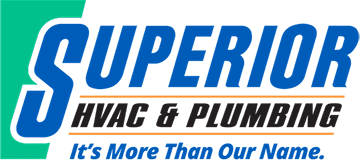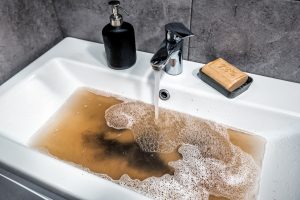If you’ve ever experienced clogged drains as a homeowner, you know how disruptive they can be to your everyday routine. Further, if not addressed, clogged drains can cause major issues that are expensive and time-consuming to repair. That’s where Superior HVAC & Plumbing comes in – not only can we give you tips on how to avoid clogged drains and the negative effects they bring with them, but we can also schedule routine inspections and drain cleaning services to ensure your drains stay clog-free all year round.
What Causes Clogged Drains?
Unfortunately, clogged drains can be a pretty common occurrence for some homeowners, and they don’t have just one root cause. Many things can cause clogs, and you can’t treat them all the same way. Here are some of the major causes of clogged drains.
- Hair (from pets or humans)
- Food
- Wipes (both flushable and non-flushable wipes can cause clogs)
- Feminine hygiene products
- Cat litter
- Fat, oil, and grease
- Foreign objects like coins, toys, etc.
However, clogged drains are sometimes caused by issues with the plumbing system itself. In these scenarios, clogs can be caused by:
- Leaks in pipes
- Pipe scale that narrows the pipes
- Pipe disintegration (that leads to leaks or bursts)
- Undersized pipes
- Tree roots pushing into the pipes
- The slope of the plumbing system being wrong
As you can see, there are LOTS of causes for clogged drains. Luckily, many of them are avoidable.
How to Prevent Clogged Drains
How can you prevent clogged drains in your home and save yourself money on repairs? Here are some expert tips to avoid this annoying issue:
Be mindful of what you’re flushing down the toilet. Avoid flushing things that shouldn’t go down like baby wipes (yes, even flushable wipes can cause clogs), feminine hygiene products, cleaning wipes, and excess toilet paper. The only things that should be going down your toilet are water, waste, and biodegradable toilet paper.
Use your garbage disposal. Putting food, scraps, and other food items down your sink can quickly cause clogged drains. Use your garbage disposal to properly chop up the food before it heads into your plumbing system. You should also avoid putting tough and fibrous items into the disposal – it won’t be able to chop them properly. Examples include eggshells, fruit and vegetable skin and peels, skin and bones, and celery. Further, be sure to run a constant stream of cold water while you’re using the garbage disposal.
Never put oil or grease down the drain. If you fry food and need to dispose of grease, pour it into a sealable container and toss it in the garbage. Grease and oil solidify when they’re cooled, which can lead to drain clogs.
Clean your drain stoppers. Drain stoppers are there to collect hair and prevent foreign objects from going into the drains, but you do need to clean them regularly so they can do their job and prevent blockages. Another hack? Brush your hair before showering to get rid of excess hair before you wash.
Bathe pets outside. If you can bathe your pets outside, do so – pet hair can quickly clog shower and tub drains. If you have to bathe your pets inside, be sure to use a drain stopper and put a washcloth over the drain to help reduce the amount of hair going into it.
Schedule routine inspections. It’s in your best interest to schedule routine plumbing inspections and have an expert take a look at your system. They can identify developing problems before they become big and expensive, and also help you schedule preventative maintenance.
Prevent Clogged Drains With Superior HVAC and Plumbing
Don’t wait until a clogged drain is causing issues in your home – prevent them today with tips and routine care. Contact Superior HVAC and Plumbing today to schedule your inspection!

